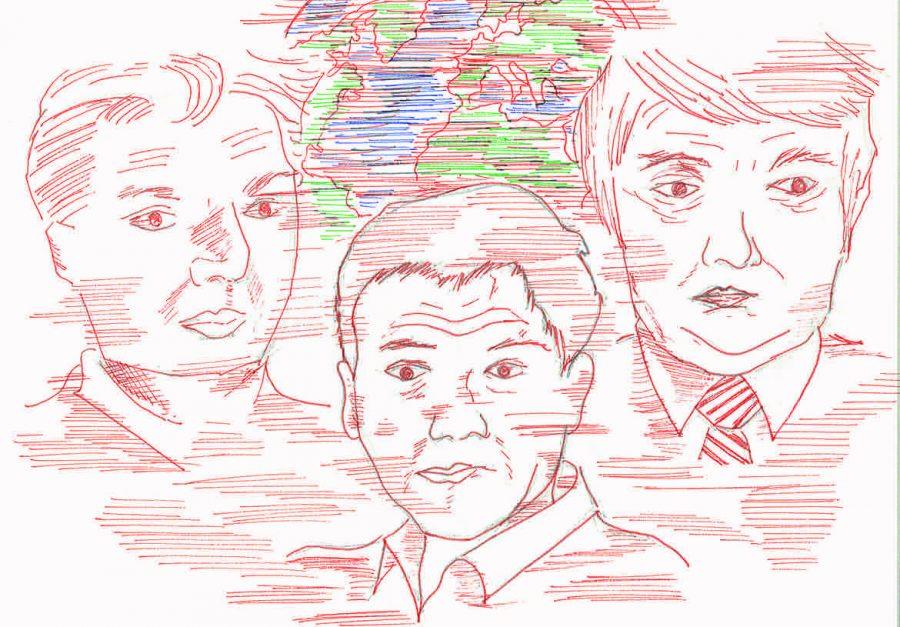For Dial’s politics editor, Trump’s victory has ominous the Dial echoes of a right-wing populist in her home country
Credit: Lei Anne Rabeje
November 21, 2016
“Bad day for the world, huh? It’s like the Philippines all over again…”
I received this text from my aunt. It was mid-afternoon in the Philippines and 3 a.m. for me, but we both watched with agony and disappointment as Donald Trump delivered his victory speech. United States had joined the bandwagon to the past, accompanied by Hungarian Prime Minister Viktor Orbán, Philippine President Rodrigo Duterte, and Brexit.
Dubbed as the “Trump of Asia,” the controversial President Duterte immediately showed his support for President-elect Donald Trump, saying, “I would like to congratulate President Trump! Long live!”
His support of Trump follows a caustic remark denouncing Philippine-U.S. relations and calling Obama a “son of a b****.” Often criticized for his tendency to speak his mind and make contradictory statements, President Duterte’s most contentious comment on a case of an Australian woman’s gang rape surpasses Trump’s vulgarity. “I was angry because she was raped, that’s one thing,” he said. “But she was so beautiful, the mayor should have been first. What a waste.”
From the provocative statements about women to the unexpected tide of support and victory, the parallels between the recent U.S. and Filipino presidential elections are uncanny. Both promoting themselves as “outsiders” with radical solutions to problems facing the common man, President Duterte and President-elect Trump are symbolic of the rise of right-wing thought and idealism.
Their promises seem hopeful and revolutionary: Give power to the people! Strengthen the military! Crackdown on drugs! But these promises are tainted with sexism, racism, and xenophobia. For President Duterte, it holds the weight of the deaths of thousands of Filipinos suspected of drug use. It means the disintegration of a proper judicial system and the fading significance of human life. In the United States, it means the deaths of innocent black lives and a continued protection of a corrupt police system. It means the devaluation of a woman’s body and an end to her reproductive rights. It means the wave of hatred towards immigrants.
Illegal immigration continues to dominate Trump’s prospective policies. Days after his election, Trump reiterated his pledge to “build a wall” and deport millions of undocumented immigrants from the United States. But these promises instigate hate and contempt towards the millions of immigrants across the country.
Trump’s conviction reflects the growing xenophobia surrounding Europe’s refugee crisis. The conflict in Syria, ongoing violence in Afghanistan, and poverty in Kosovo created a surge in the number of migrants seeking asylum in Hungary, Germany, and UK, amongst the many European countries. According to BBC News, those who seek asylum in Hungary have reportedly been treated “like animals” — being placed in pens and concentration camps.
The discontent with migrants reached its climax on June 24, 2016 in Great Britain when 51.9% of the electorate voted in favor of leaving the European Union. The referenda to leave the EU was first proposed in 1994 and has been rejected for almost 20 years, with the Referendum Party failing to gain seats in Parliament until this year. Though economic and political factors contributed to Brexit, many “Leave” voters admit to immigration as the determining factor of their vote.
As waves of migrants enter Great Britain from the Middle East, manifestations of cultural and job anxieties governed the minds of many voters. With the growing distrust in the government and a change in job quality and security, many “Leave” voters feared the migrants would potentially “steal” their jobs, a sentiment reflective of today’s America.
With Trump’s anti-immigrant rhetoric, Brexit, and Duterte’s war on drugs dominating politics, the world sees a shift to right-wing ideologies of nationalism, conservatism, and Christian Democrats. Will Trump really build a wall? And what will his wall mean for immigration around the world?

